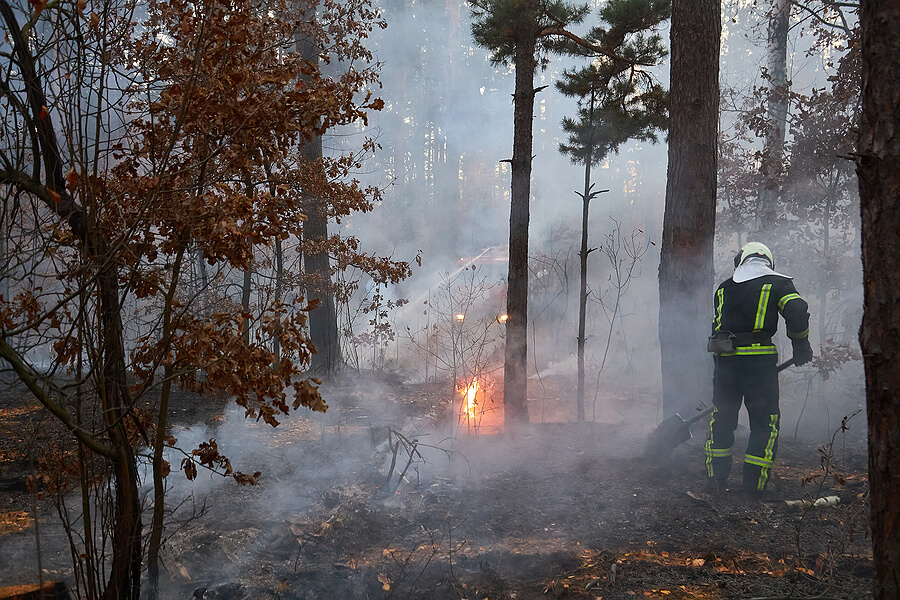Hawaii, Greece, Canada – all around the world, people are losing homes to uncontrollable wildfires. While this is not the first time that the hot summer temperatures have been scorching the Earth’s greenery, the catastrophe of this year’s proportions has not been recorded before.
If you have a home to return to after the wildfires of 2023, you’ve been very lucky.
You probably have questions regarding your family’s safety. In this article, you’ll find health-related advice and practical tips on how to restore your home after it’s been exposed to fire and smoke:

Inspect Your Fridge, Freezer, and Food
You’ve probably been out of your home for at least a week, maybe even longer, so most of the food you left in your fridge was already spoiled anyway. If you can’t tell whether or not it’s safe to consume, it’s best to throw it away. You don’t want to risk getting food poisoning.
Canned goods and food that’s been stored in plastic packaging aren’t safe to consume after a wildfire either. Heat can burn certain materials, like plastic, and cause toxic fumes that can contaminate food. Jar lids can get loose, allowing smoke, ash, and bacteria in. Get rid of them, too.
Electricity doesn’t mix well with fire, so it’s highly likely that your house was out of power at a certain point. It takes 4 hours for food to spoil in a powerless refrigerator, while frozen food can last up to 48 hours in a full freezer. If you suspect that the power was out, throw everything out.
Power outages, as well as fire and smoke alone, can damage electronic appliances. It’s not a bad idea to contact the insurance company and have your fridge, freezer, and other kitchen appliances checked. If they need to be repaired or replaced, remember to keep the receipt for your lawyer.
Throw Out All Heat-Sensitive Products
Many products we use daily are sensitive to heat and can get spoiled if exposed to high temperatures. Some of the commonly used heat-sensitive products are:
- Medicines
- Cosmetic products
- Cleaning supplies
Not only do they need to go, too, but they should also be disposed of in a certain way. Some chemicals can become toxic after long-term exposure to heat, so you can’t just throw them in the trash. Contact your local waste services provider, explain the situation, and ask for advice.
Medicines that should be thrown out should be taken to a local pharmacy.
Taking Care of Electronics After Wildfire
Depending on how badly your house was affected, your electronic devices are probably full of ash and smoke. If they don’t have visible traces of burning down, such as soot, you can take them out and blow out the ash with an air hose. Remember to wear gloves and a mask, just in case.
If your electronics are heavily damaged, it’s best to contact a certified technician to inspect them. If it turns out that they are beyond repair, take photos before you throw them out.
Document Everything and Ask for Compensation
The reason you need to keep receipts and photograph everything is that wildfire survivors are eligible for financial help and compensation. Whether or not you’re insured, you should get compensated for every item you’ve lost – on top of the stress, risk, and emotional damage you’ve endured.
In 2022, 78 buildings were destroyed, and 31 properties were damaged in the Mosquito Fire in El Dorado and Placer County. Survivors of this tragic event have hired a California fire lawyers Matt Huffman Law, to help them file a lawsuit and recover their losses.
Whether or not you decide to seek legal help and ask for the compensation you deserve, you should still document everything while restoring your home after a wildfire. That’s important evidence that might be useful to your community and environmental activists in the fight against wildfires.
How to Clean Up After Smoke and Ash
It’s crucial for your health to wear protective equipment – mask, gloves, and boots when cleaning your home from ash, soot, and debris after a wildfire. Ideally, you should call a professional cleaning agency and let them handle potentially hazardous materials such as soot.
If you’re cleaning your house yourself, you’ll need some kind of pressure washer. A sprayer and a regular garden hose might be useful if there isn’t a lot of ash around your house.
If you don’t have a pressure washer, don’t use a leaf blower as an alternative. That will only scatter the ash, and you’ll risk contaminating the inside of your home. For the same reason, you should pay special attention when cleaning your HVAC vents from ash and debris.
Your Home Needs to Breath – Help It
After a wildfire, the most important thing you need to do is help your house breathe. Without enough airflow, you’re at dire risk of carbon monoxide poisoning. Get your air conditioning system a professional treatment and leave your windows open to let the fresh air in.


